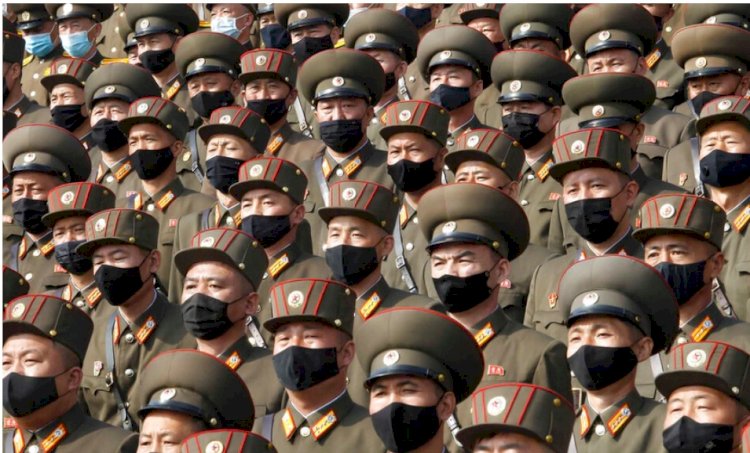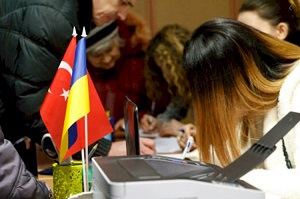North Korea Tops Agenda for US-Japan-South Korea Meeting
It will be the first such three-way meeting of the countries since Joe Biden became U.S. president.

North Korea Tops Agenda for US-Japan-South Korea Meeting
"Every aspect of North Korea policy" will be discussed when national security advisers from the United States, South Korea and Japan meet on Friday, according to a senior administration official in Washington.
It will be the first such three-way meeting of the countries since Joe Biden became U.S. president.
The talks come amid important differences in policy toward North Korea among Washington, Seoul and Tokyo, according to analysts.
North Korea's recent missile provocations, the response by Pyongyang to the coronavirus, and recent diplomatic discussions between China and North Korea are on the agenda, according to the U.S. official, who told reporters Thursday that "our intent is to have a deep review that will inform our process forward."
The meeting at the U.S. Naval Academy in Annapolis, Maryland, comes after North Korea test-fired into waters a cruise missile and then a pair of short-range ballistic missiles.
"Anything that we do with respect to North Korea, we believe we need to do in partnership and in harmony with Japan and South Korea," said the senior administration official, speaking on condition of not being named.
"It's unlikely that there will be any trilateral breakthroughs at Annapolis or in the coming year before the South Korean presidential election" next year, predicted Sue Mi Terry, senior fellow and Korea chair at the Center for Strategic and International Studies.
US seeks change
The conversations at the Naval Academy will follow travel by Secretary of State Antony Blinken and Defense Secretary Lloyd Austin to Japan and South Korea. Such visits meant to demonstrate that Biden seeks to bolster U.S. alliances in Asia following a rocky four years under the previous administration.
Former President Donald Trump criticized Tokyo and Seoul as "free riders" that did not contribute sufficiently for their own defense under the U.S. nuclear umbrella. Trump sought more money from Japan and South Korea, which both host numerous U.S. military bases on their soil.
The senior administration official said Friday's talks would also touch on other regional issues of mutual concern, including the "tragic situation in Myanmar" and Beijing's growing assertiveness in the South China Sea.
"It's very critical for them to get on the same page and closely coordinate on China and North Korea. But a big challenge is getting Seoul on board," Duyeon Kim, adjunct senior fellow of the Indo-Pacific Security Program at the Center for a New American Security, told VOA.
South Korean President Moon Jae-in is viewed as reluctant to join efforts to increase pressure on China, more so if that includes open cooperation with Japan.
"Getting Seoul's participation on China and in trilateral cooperation will require a ton of creativity and spin at best," predicted Kim. "Anti-Japan sentiment runs especially deep in Moon's base, to the point where they can't compartmentalize and cooperate on common challenges like North Korea, in contrast to the previous conservative government [in South Korea]."
Better 'atmospherics'
Yuki Tatsumi, a Stimson Center senior fellow, agreed and noted "a great amount of frustration" among those in Washington due to Seoul's continuing to push Tokyo, its former colonizer, on issues about history "when there's way more serious stuff going on in Pyongyang."
The fundamental differences between Japan and South Korea over history "can't readily be altered," Terry concurred. "But at least the atmospherics should improve somewhat after the rock-bottom relations between Japan and South Korea in recent years, because the Biden administration has made it a priority to get Seoul and Tokyo more in alignment or at least less at odds. There will be at least a show of cooperation even if the substance is lacking. But symbols count for a lot."
South Korea has been slightly warming to Japan because it desires a four-way meeting with North Korea at this year's Tokyo Olympics, hoping that could lead to a renewed flurry of summitry, according to Kim.
"But it's pretty clear Washington and Seoul are at odds on the timing and conditions for a U.S.-North Korea summit," Kim told VOA.
Tatsumi said Japan shares some of the blame for the state of its relationship with South Korea, which hinders three-way progress because "they are completely wary of the current government [in Seoul] and have zero interest in engaging with them in any way whatsoever."
Analysts expect Pyongyang, in response to the trilateral huddle, will have an attention-seeking reaction.
"North Korea will likely engage in further provocations, starting slowly to test the Biden administration and increasingly building up pressure if they don't get what they want," Terry told VOA. "In other words, they will likely revert to their tried-and-true tactics to deal with any new administration."
voa







































